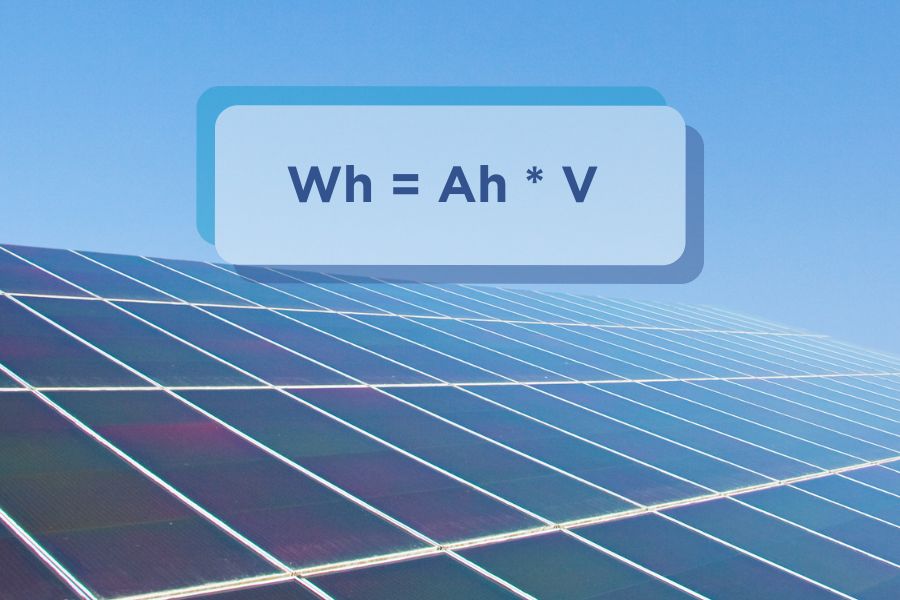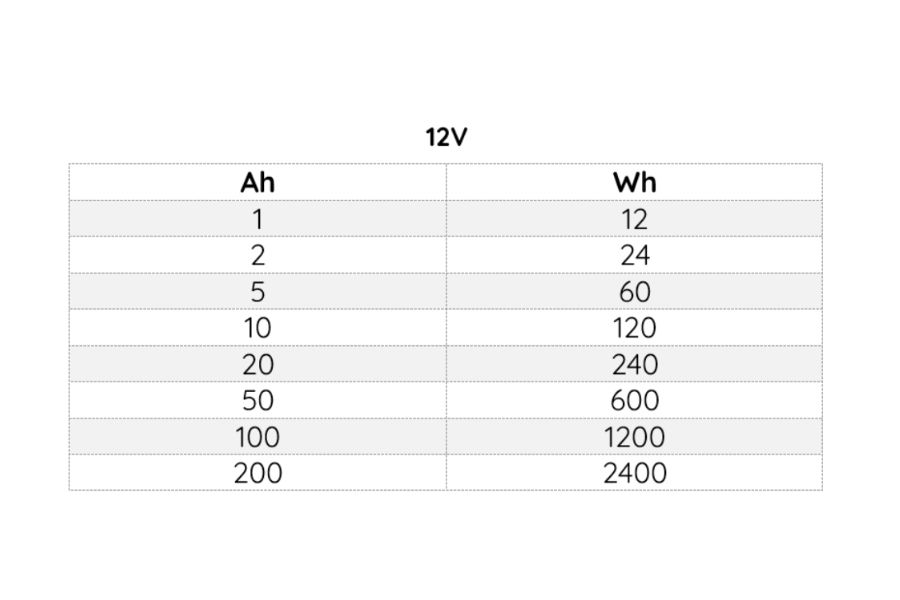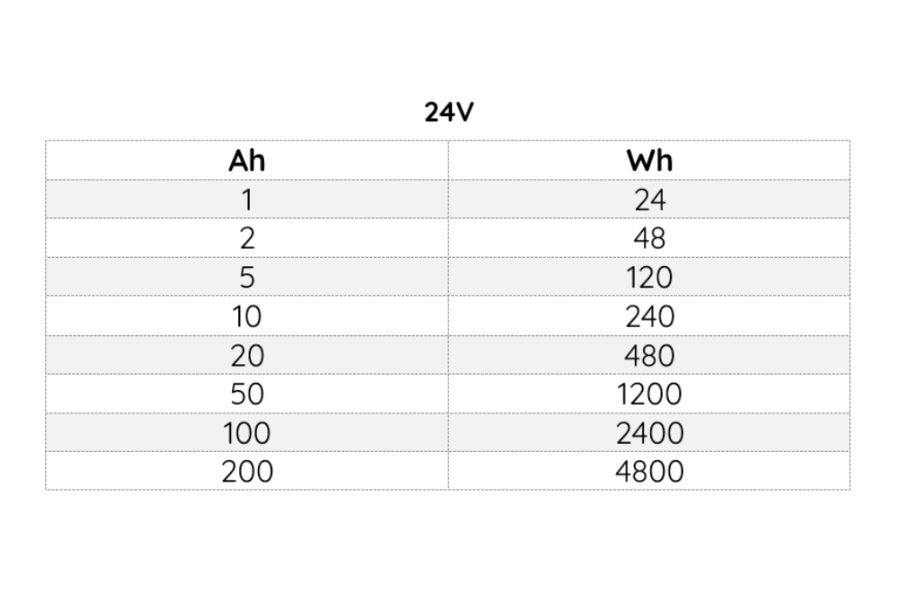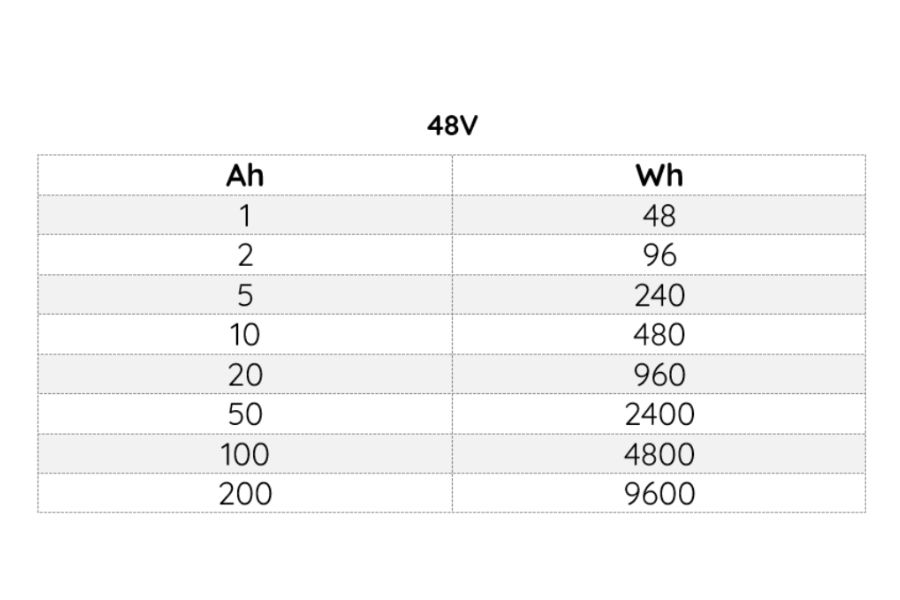Ah × V =
0.00 Wh
Conversion formula: Wh = Ah × V
What Is Amp-Hours (Ah)?
Amp-hours is typically used to measure the charge stored in a battery or any other electric power source. It represents how much charge a battery can give off over one hour.
Amp-hours (Ah) is derived from the combination of electrical current (amps) and time (hours). As such, a one amp-hour rating means that a battery or power source can generate one amp of charge over one hour. It could also mean that a one amp-hour battery can generate two amps of charge over half an hour.
What Is Watt-Hours (Wh)?
Like amp-hours (Ah), watt-hours is a unit of battery capacity. But while amp-hours measure how much charge a battery can give off over an hour, watt-hour measures how much power a battery can give off over an hour.
On a broader scale, watt-hours is one of the units of electrical energy. It represents the amount of energy consumed or generated when a given amount of power is used up or given off over a certain number of hours (for a battery, the battery life).
According to the definitions above, one watt-hour is the energy discharged or consumed by one watt of power within one hour.
How to Convert Amp-Hours to Watt-Hours (Ah to Wh)

As mentioned earlier, Wh is the unit for electrical energy. So, to get the formula for converting amp-hours (Ah) to watt-hours (Wh), we need to show the relationship between electrical energy and battery capacity.
To show this relationship, we’ll define the unit of electrical energy:
\(\small{electrical\ energy\ (Wh) = power\ (W) * time\ (h)}\ (1)\)
Next, we’ll state the formula for power and do a substitution in (1):
\(power\ (W) = voltage\ (V) * current\ (A)\ (2)\)
\begin{split}
\small electrical\ energy\ (Wh) & = voltage\ (V) * current\ (A) \\
& * time\ (h)\ (3)
\end{split}
Rewriting (3) with units:
\(Wh = V * A * h\)
\(Wh = V * Ah (4)\)
Going by (4), to convert watt-hours from amp-hours, we must multiply amp-hours by battery voltage.
Example 1
If you have a 50 Ah lithium battery whose nominal voltage is 24 volts, what’s the nominal capacity of the lithium battery in watt-hours?
\(24 * 50 = 1200\ Wh\)
Example 2 – Batteries in Series
How many watt-hours is stored in a battery bank of two lithium batteries connected in series if they both have the same voltage (20 volts) and same capacity (80 Ah)?
Since the batteries are in series, their total voltage V would be:
\(V = 20 + 20 = 40\ volts\)
Also, since the batteries are in series, they’ll experience the same current. So, their capacity in Ah would be 80 Ah.
Now that we know the overall voltage and capacity of the batteries, the capacity in watt-hours would be:
\(40 * 80 = 3200\ Wh\)
Example 3 – Batteries in Parallel
Three 24 V lead-acid batteries are connected in parallel. If each battery’s capacity is 48 Ah, what’s the capacity of the circuit?
Since the batteries are in parallel, the voltage throughout the circuit would be the same – 24 V. However, the current would be the sum of the individual currents of the units. Therefore, the total capacity of the batteries in amp-hours would be the sum of the individual amp-hours of the batteries.
\(\small{Total\ amp\mbox{-}hours\ of\ the\ batteries = 48 + 48 + 48}\)
\(= 144\ Ah\)
Now that we know the total capacity and voltage of the parallel connection, the capacity in watt-hours is:
\(24 * 144 = 3,456\ Wh\)
When Will You Need to Make Amp-Hour to Watt-Hour Conversions?
Comparing Batteries of Different Voltages
We can directly compare the Ah capacities of batteries with the same voltage. However, doing the same for batteries with different voltages may give us an inaccurate outcome. This is so because the energy stored in a battery depends on its amp-hours and voltage.
For clarity, based on their amp-hour ratings, we can readily say a 30 Ah, 12 V battery will store more energy than a 20 Ah, 12 V battery. This is true because whether we factor volts into how much energy/charge the battery stores or not, the 30 Ah will always have the capacity rating.
But then, if they were rated 30 Ah, 12 V, and 20 Ah, 48 V, we’d be wrong if we concluded that the 30 Ah battery stores more energy. Since both now have different voltages, we must convert amp-hours to watt-hours to make an accurate comparison.
The 30 Ah battery would be 360 Wh, while the 20 Ah battery would be 960 Wh. Their watt-hour ratings show that the 20 Ah battery will store more. So, if we’d assumed that the 30 Ah had a higher capacity, we would have been wrong.
Assessing Your Energy Needs Against the Energy the Battery Can Generate
When you know your devices’ total energy consumption, choosing an ideal battery or power station is much easier.
Say the devices you want to power with your solar generator consume an average of 200 Wh per day. If you want a battery that you only have to recharge once daily, you know to opt for a 200 Wh battery.
But if you’d prefer recharging the battery every two days, you can opt for a 400 Wh battery instead.
Amp-Hours to Watt-Hours Conversion Chart
These are quick Ah to Wh conversions at common battery voltages:



Amp-Hours vs Milliamp-Hours vs Watt-Hours (Ah vs mAh vs Wh)
As mentioned earlier, amp-hours, milliamp-hours, and watt-hours are all battery capacity units. However, they differ significantly.
While amp-hours and milliamp-hours do not factor voltage into measuring a battery’s capacity, watt-hours do. This is why watt-hours is more reflective of the energy stored in a battery. Amp-hours and milliamp-hours, on the other hand, are more reflective of the amount of charge stored in a battery.
Amp-hours and milliamp-hours are closer to each other than watt-hours. However, their magnitudes of measurement differ.
Ah measures in multiples of one, while mAh measures in multiples of thousandths. So, values measured in Ah are larger than corresponding values in mAh.
How to Convert Watt-Hours to Amp-Hours (Wh to Ah)
The formula for converting watt-hours to amp-hours is pretty much the reverse of the Ah to Wh formula.
So, while the Ah to Wh formula involves multiplying Ah by voltage to convert to Wh, the Wh to Ah formula involves dividing Wh by voltage to convert to Ah.
\(Wh = Ah * V\)
Dividing both sides by V:
\(Ah = \displaystyle{\frac{Wh}{V}}\)
Example
When at 20% charge, a car battery’s minimum voltage is 11.9 volts, which can only give off 20 Wh. What’s the amp-hour capacity of the battery when it’s at 20%?
\(Ah = \displaystyle{\frac{20}{11.9}} = 1.68\ Ah\)

